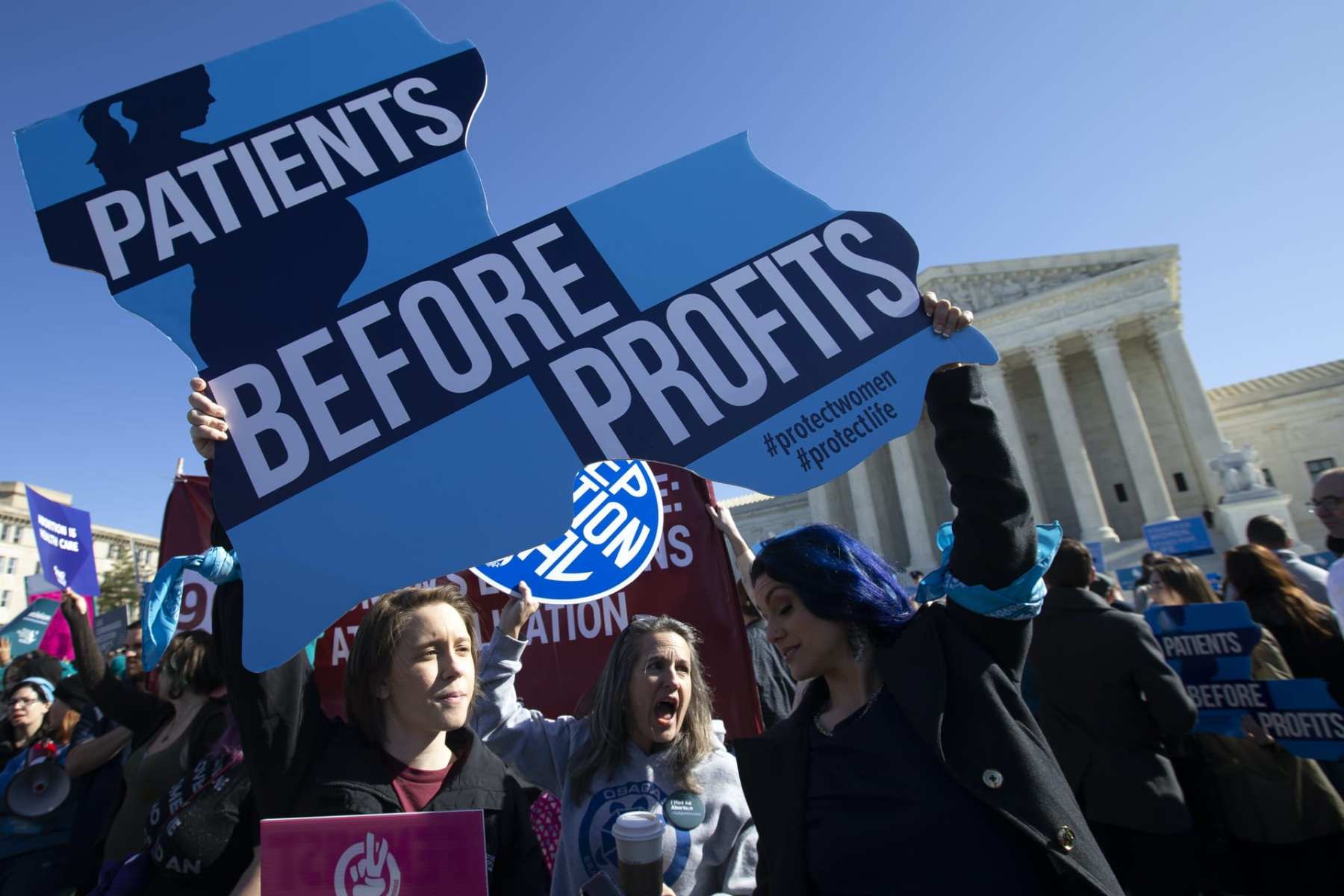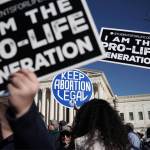We’re the only newsroom dedicated to writing about gender, politics and policy. Subscribe to our newsletter today.
Voters in Louisiana and Colorado will determine whether or not to implement new state-specific abortion restrictions — a prelude to reproductive health battles that activists expect will play out across the country with a more conservative U.S. Supreme Court.
In Louisiana, residents voting in the general election are being asked to amend the state constitution to explicitly limit abortion rights. Colorado voters, meanwhile, are deciding whether to ban abortions after 22 weeks of pregnancy (defined as since the last menstrual period), with exceptions only if the parent’s life is immediately endangered by continuing with pregnancy — at which point, doctors say, the parent would be likely to die regardless of medical intervention.
The battles over these initiatives are happening as President Donald Trump and former Vice President Joe Biden cast themselves on opposing ends of the issue. Trump has campaigned against abortion access, while Biden has said that, if elected president, he would prioritize enshrining the constitutional protections guaranteed in Roe v. Wade.
Meanwhile, advocates on both sides of the issue believe that Monday’s confirmation of Amy Coney Barrett could lead to restrictions on abortion access. Barrett has previously suggested that Roe v. Wade was wrongly decided, and, as a federal judge, signed onto dissenting opinions that supported greater abortion restrictions.
If the landmark 1973 ruling is overturned, the future of abortion access will be decided by states.
Amendments like Louisiana’s are meant in anticipation of Roe v. Wade’s precedent being overturned, said Elizabeth Nash, who tracks state policy for the Guttmacher Institute.
“If the federal protections are dismantled, and there are no protections in the state constitution, it’s much easier to pass an abortion ban,” she said.
Colorado and Louisiana, then, could be seen as test cases for the future of abortion access. Nash said if restrictions pass in Louisiana and Colorado, those could help create a playbook for abortion opponents to advance policies either through a petition-led ballot initiative or, if that’s not possible, state constitutional amendments first pushed through statehouses.
Amendment 1 in Louisiana
Even before Justice Ruth Bader Ginsburg’s death in September raised alarms for abortion access advocates, Katrina Rogers said she has been working under the premise that abortion access was not safe in the courts.
“I was always running this campaign with the assumption of Roe being overturned, and not in the far off future,” said Rogers, the campaign director for Louisiana for Personal Freedoms, a coalition working to reject the constitutional amendment. “We can’t afford to be lackadaisical, or not move with a sense of urgency when it comes to protecting people’s lives and wellness and rights and bodily autonomy.”
The ballot measure in Louisiana, known as Amendment 1, asks voters to approve new language to the state constitution that would say the state does not protect the right to an abortion nor will the state pay for one. (The state already prohibits Medicaid funding for abortions unless there is a health emergency or if there is a case of rape or incest.)
“The amendment is sweeping in that it really makes no room for abortion,” Rogers said, also calling the measure “an attack on abortion access” and one that its residents did not seek.
The state legislature approved the constitutional amendment during its 2019 session with at least two-thirds of the vote, sending the proposal to voters. While Republicans control both legislative chambers, several Democrats also supported the measure, including a Democratic state senator who introduced the proposal.
It comes just months after the U.S. Supreme Court struck down a different Louisiana state law that would have required doctors who perform abortions to have admitting privileges at a nearby hospital. The court ruled that a nearly identical Texas law was unconstitutional in 2016.
Constitutional amendments to restrict abortion rights are not new. Tennessee voters approved a similar measure in 2014; voters in West Virginia and Alabama did the same in 2018. The ballot measures in Tennessee and West Virginia were close, with just over half of voters approving them.
Pearl Ricks, the executive director of Reproductive Justice Action Collective, an organization based in New Orleans that provides emergency contraception and does advocacy work, is worried about the ramifications of the amendment and is working to reject it. Ricks said that when abortion access comes down to where you live, low-income people are less likely to be able to afford costs associated with travel and taking time off of work.
“The idea of having an unexpected cost come up that involves not only the procedure, but the transportation, and the lodging and the child care for some people who already have their families started, when we look at the idea of getting that done, there aren’t a lot of people that can successfully do that by themselves,” they said.
They also said it’s important to acknowledge that policies that restrict abortion access also limit reproductive rights for transgender and nonbinary people who become pregnant.
Rogers believes in a world where Roe v. Wade is overturned, wealthy people will be able to travel out-of-state to access an abortion. In Louisiana, the procedure would become effectively illegal. The state has enacted at least 89 abortion restrictions since the Roe ruling, more than any other in the country.
“If you’re of means it’s an inconvenience, and if you aren’t of means it can be death or criminalization,” she said.
Louisiana Right to Life claims on its website that the measure, which it calls the “Love Life Amendment,” will ensure judges cannot establish abortion rights. The organization points to state Supreme Court rulings elsewhere that have previously upheld abortion rights following legal challenges.
“Their decisions have resulted in pro-life laws being struck down by judges, reinforcing an abortion-on-demand policy. We can’t let this happen in Louisiana,” reads a passage on the group’s website.
If it succeeds, Louisiana’s measure could spur other states to consider similar constitutional amendments, Nash said.
“What you imagine is that the states in the South and the Midwest will continue to adopt abortion restrictions and work to make it even harder to access services,” she said. “While states on the West Coast and in the Northeast will look to not only protect abortion legally, but ensure that access is available and affordable.”
Julie Warden agrees. She is an organizer who tried to defeat the abortion amendment measure that ultimately passed in West Virginia in 2018. Days after the measure passed, a health state agency issued a public notice to clarify that Medicaid would now only cover abortion in instances where a pregnant person’s life is endangered, if the fetus has defects or is unlikely to survive, or if there is a case of rape or incest.
Warden is the chief operating officer at WV FREE, a West Virginia organization that advocates for reproductive health rights in the state. She is concerned about the ramifications of giving the state government more power over bodily autonomy.
“If you start today by taking my rights away, whose rights are you going to come for tomorrow?” she said.
Proposition 115 in Colorado
In Colorado, much like Louisiana, the proposed restrictions could have significant consequences both within the state and for access in other parts of the country. Currently, Colorado does not limit when in pregnancy someone can get an abortion.
The proposed ban, which does not include exceptions for cases of life-threatening abnormality in the fetus or for cases when the pregnancy is a result of rape or incest, would put Colorardo in line with 18 other states that ban abortion sometime between 20 and 22 weeks, per the Guttmacher Institute.
If it passes, Proposition 115 would have ramifications both within Colorado and beyond the state. More than 11 percent of abortions in Colorado are performed on people who have traveled from one of 30 other states, per 2019 data from the state’s department of health. Guttmacher has also estimated that, if it passes, people seeking abortions at 22 weeks or after would have to drive at least 300 miles each way to seek such care.
The vast majority of abortions occur before 22 weeks. But research shows that people who do terminate pregnancies at that point often are younger and disconnected from the health care system in other ways — they have lower incomes, may have faced challenges finding a physician or are more often experiencing domestic violence.
“What we see with this ban is it would potentially impact people who are already facing the most barriers,” said Dr. Rebecca Cohen, an OB/GYN in the Denver area who is campaigning against the initiative.
Some patients have also discovered abnormalities that threaten the life of the fetus, or have learned that going forward could jeopardize the parent’s health, she said. Still, there isn’t good data tracking how often abortions performed at this stage of pregnancy are prompted by those specific health concerns.
Dr. Tom Perille, a retired internal medicine doctor who heads the state’s Democrats for Life, argued that, if the ban is passed, people can get screenings earlier to determine if they want to proceed with pregnancy.
In cases where a fetal abnormality is discovered, he argued that parents should instead seek perinatal hospice after birth — in which doctors work to limit a newborn’s suffering, even if the baby isn’t expected to live long. (The American College of Obstetricians and Gynecologists argues that such hospice should be offered as one option, along with abortion.)
Polling suggests Colorado voters are about evenly split, with 13 percent of voters still undecided. And even if the ban passed, it could still face legal challenges. Colorado’s attorney general has argued that the ban would not satisfy existing Supreme Court precedent, which holds that abortion rights are protected up until a fetus is viable. Medical consensus typically suggests that viability emerges around 24 weeks.
If Colorado’s ban passes, that could similarly spur abortion opponents to try their luck in more traditionally blue states, where the statehouse or governor’s office otherwise might not support those policies.
“Ballot initiative is a way to essentially query voters. When you have no success at the legislative level, you have another option,” Nash said. “Certainly some other states might take notice of however [it] pans out for their next steps.”





